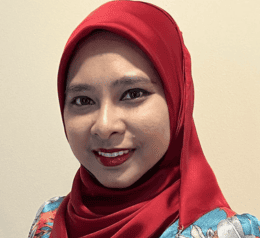4th Global
Women’s Empowerment & Leadership Summit
THEME: "Break Barriers, Build Futures"
 27-28 Oct 2025
27-28 Oct 2025  Bali, Indonesia
Bali, Indonesia THEME: "Break Barriers, Build Futures"
 27-28 Oct 2025
27-28 Oct 2025  Bali, Indonesia
Bali, Indonesia 
International Islamic University Malaysia, Malaysia
Title: Family-Friendly Work Practices in Selangor: Action Study on Flexible Working Arrangement and Shared Parental Leave for Talent Retention
Rabi’ah Aminudin is an Associate Professor in the Department of Political Science at the International Islamic University Malaysia (IIUM). Her research and teaching focus on institutional dimension of governance, gender and politics, and identity politics and public policy. She has led and contributed to research projects on women leadership, institutional reform, environmental democracy, and identity-based extremism in multicultural societies. Actively involved in university governance, she is currently the president of the university’s Academic Staff Association. Through her scholarship and leadership, Rabi’ah is dedicated to advancing knowledge and fostering critical engagement on issues related to good governance and societal transformation.
This study investigates the implementation of family-friendly employment practices in Selangor, focusing on flexible work arrangement and shared parental leave as strategies for talent retention. While Malaysia has made significant legislative progress such as extending maternity leave to 98 days and 7 days for paternity leave, the uptake of flexible arrangements remains uneven, and gender-based disparities persist.
Using a mixed-methods design, the research combined a survey of 165 employees from Selangor state-owned companies with focus group discussions involving management and staff. Findings show strong support for flexible work arrangement, with nearly 80% of respondents linking them directly to job satisfaction, productivity, and mental health. Similarly, 74% agreed that shared parental leave is critical for workplace gender equality, though cultural norms still constrain its acceptance.
The thematic and sentiment analyses highlighted challenges such as inconsistent implementation, managerial discretion, and lingering stereotypes about gender roles. Nonetheless, employees overwhelmingly viewed family-friendly policies as essential for work-life balance, fairness, and long-term retention.
The report concludes with several policy recommendations: standardizing flexible work arrangements across agencies, extending shared parental leave to normalize caregiving responsibilities, shifting performance evaluations towards output-based measures, and expanding childcare support. Together, these reforms can strengthen gender equity, organizational trust, and competitiveness, positioning Selangor as a leader in inclusive and sustainable employment practices.